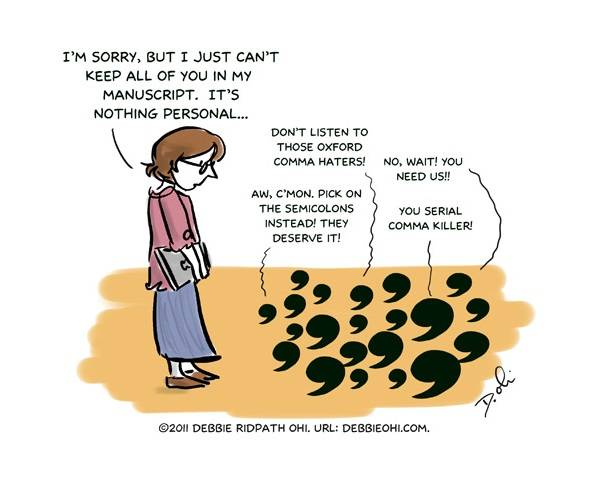
You may be wondering what is so special about the Oxford comma and why there are so many delightful memes about it. Some context: the comma before the “and” in a list of three or more items is known as the Oxford comma (also known as the serial comma). You may have heard some debate about whether or not this comma is necessary.
Let me assure you—it is.
While it pains the editor in me to say, there are times when a comma doesn’t really matter. You can put it in or leave it out, and the sentence will survive. Readers will comprehend the nuanced meaning, and life will go on. Those commas are often called stylistic commas, and they may rely on their surroundings. Does the previous section or sentence have a lot of commas? Can you get the meaning across without including this one? Then leave it out to spare your reader’s attention span and focus on the important things instead.
The Oxford comma, however—that comma in a list of three or more things—is NEVER a stylistic comma. It is never optional. It means something very specific in a certain situation, and when you need it to be there, you really need it to be there.
Essentially, here’s what the Oxford comma says: these three (or more) items are not related to one another, as in, they are not dependent on the previous item to make sense.
Consider the sentence:
Tonight, at my computer, I drank a cup of tea, a bottle of water, and a can of lime Bubbly.
This sentence has three separate things: tea, water, and Bubbly.
Here’s what happens if I remove the Oxford comma.
Tonight, at my computer, I drank a cup of tea, a bottle of water and a can of lime Bubbly.
Ew. Right now, my cup of “tea” is apparently a mixture of water and lime Bubbly. When you don’t have the Oxford comma, what you are conveying through your punctuation is that the two (or more) items following the commas are EXAMPLES of that first item.
My heroes are my parents, Captain America, and Oprah Winfrey.
Great, you have three heroes: parents, Captain America, and Oprah. Awesome.
My heroes are my parents, Captain America and Oprah Winfrey.
Uhh, really? I didn’t know Cap and Oprah were a thing…
When you leave out the Oxford comma, you change the meaning of the sentence and the relationship between those listed items. Instead of a list, everything after the first becomes an example.
Hence, the litany of glorious memes!
Or you can even argue that the items following the first are being addressed in the sentence!
So, let your readers get the message you’re trying to send. Use the Oxford comma.

